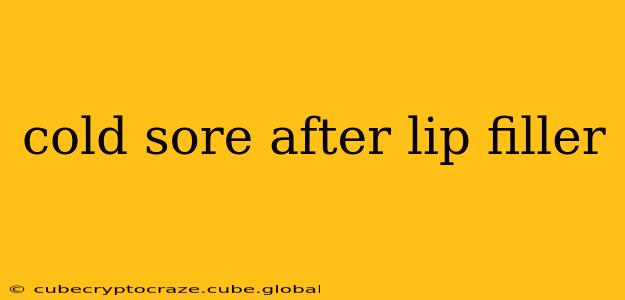Lip fillers are a popular cosmetic procedure, offering a way to enhance lip volume and shape. However, one potential side effect that can cause significant concern is the development of a cold sore (also known as a fever blister or oral herpes). This article explores the connection between lip fillers and cold sores, answering frequently asked questions and providing valuable information on prevention and treatment.
Why Do I Get a Cold Sore After Lip Filler?
The appearance of a cold sore after lip filler isn't a direct consequence of the filler itself. Instead, the procedure can trigger an outbreak in individuals who already carry the herpes simplex virus (HSV), the virus responsible for cold sores. The injection process, while minimally invasive, can cause minor trauma to the lip tissue. This trauma, even if subtle, can activate the dormant HSV virus, leading to a cold sore. Think of it like a stressor for the virus – the procedure acts as a trigger, not the cause.
Can Lip Filler Cause Cold Sores? (Does the filler itself cause cold sores?)
No, the filler itself does not cause cold sores. The filler material is inert and doesn't contain anything that would directly induce a herpes outbreak. The connection lies in the reactivation of a pre-existing viral infection due to the minor trauma associated with the injection.
How Long After Lip Filler Can a Cold Sore Appear?
The timing of a cold sore outbreak after lip filler can vary. It can appear within a few days of the procedure or, in some cases, up to a week or two later. The latency period depends on individual factors, including the severity of the HSV infection and the patient's immune response.
What Can I Do to Prevent Cold Sores After Lip Filler?
Prevention is key! Here are several strategies to minimize the risk of a cold sore outbreak after lip filler:
- Pre-treatment antiviral medication: Discuss with your injector the possibility of taking an antiviral medication, like acyclovir or valacyclovir, for a few days before and after the procedure. This can suppress the virus and prevent reactivation.
- Communicate with your injector: Before the procedure, inform your injector about any history of cold sores or herpes simplex virus. They can take precautions during the procedure to minimize trauma.
- Maintain good hygiene: Avoid touching your lips unnecessarily, and always wash your hands before and after touching your face.
- Avoid triggers: Stress, sun exposure, and illness can all trigger cold sore outbreaks. Minimize these as much as possible in the days leading up to and following your lip filler appointment.
- Boost your immune system: A strong immune system is better equipped to fight off viral infections. Focus on a healthy diet, adequate sleep, and stress management techniques.
What Should I Do If I Get a Cold Sore After Lip Filler?
If a cold sore develops, contact your injector or a healthcare professional. They can advise on appropriate treatment options, which may include antiviral creams or oral medications. Avoid touching or picking at the cold sore to prevent spreading the infection or causing scarring.
Can I Get Lip Fillers If I Have a History of Cold Sores?
Yes, you can still get lip fillers if you have a history of cold sores. Open communication with your injector is essential. They can help you manage the risk of an outbreak by taking preventive measures as discussed above.
Is it safe to get lip fillers if I have a cold sore?
No, it is not safe to get lip fillers if you currently have an active cold sore. The injection site must be completely healed and free from any active infection before proceeding with the procedure. The risk of infection spreading and causing complications is too high.
This information is for general knowledge and does not constitute medical advice. Always consult with a qualified healthcare professional for any health concerns or before making any decisions related to your health or treatment.
